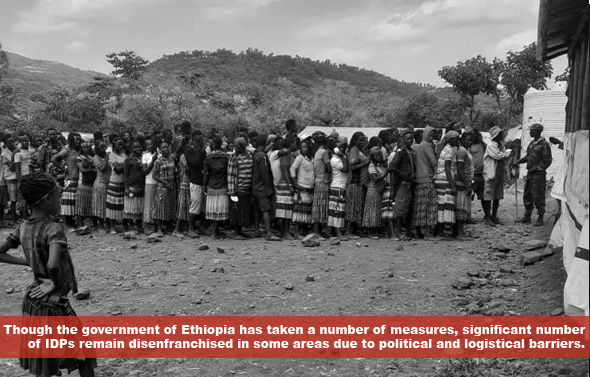Making the right to vote of IDPs a reality: Lessons from Ethiopia
Posted: 8 July, 2021 Filed under: Enguday Meskele Ashine, Omotunde Enigbokan | Tags: African Convention for the Protection and Assistance of Internally Displaced Persons, displacement, EHRC, election monitoring, elections, Electoral Proclamation, Ethiopia, Ethiopian Human Rights Commission (EHRC), IDP, IDPs, Kampala Convention, legislation, national election, National Election Board of Ethiopia (NEBE), political rights, right to political participation, the right to vote 2 Comments Authors: Enguday Meskele Ashine & Omotunde Enigbokan
Authors: Enguday Meskele Ashine & Omotunde Enigbokan
Ethiopia held its national election on 21 June 2021. Internally displaced persons (IDPs) participated in the national election by casting their votes at their place of displacement for their respective constituency of origin through absentee ballot procedure. In certain areas, the government of Ethiopia took special measures such as providing logistic and security safeguard in order to enable IDPs to cast their vote.
The Ethiopian Human Rights Commission (EHRC) played a pivotal role in ensuring that IDPs participated in the national election, through engaging civic societies that advocated for the voting rights of IDPs. Furthermore, the EHRC prepared the Human Rights Agenda for Election 2021. This Agenda ‘calls upon political parties to address human rights protection of vulnerable groups including IDPs in their manifesto.’ In addition, the Commission advocated for electoral participation of IDPs by disseminating explanatory materials on IDPs and election, by conducting election monitoring focusing on IDPs’ participation in the national election and by conducting stakeholder’s discussions highlighting the significance of IDPs’ inclusion in the national election.’
Ethiopia has made a major stride in recognising electoral rights of IDPs’. This can be seen in the Electoral Proclamation No. 1162/2019 which provides for IDPs’ enfranchisement in election. The National Election Board of Ethiopia (NEBE) also adopted a directive No.13/2021, on the establishment of special polling station for IDPs. This directive guarantees absentee ballot arrangement for the purpose of enfranchising IDPs living far from their constituencies. The directive as well captures IDPs’ concern by circumventing onerous residency and documentation requirements. Knowing fully well that Ethiopia has encountered unprecedented rise of internal displacement while preparing for national elections, this is a very encouraging development for Ethiopia.
 Photo by Enguday Meskele
Photo by Enguday Meskele
What it means for Ethiopia
By adopting enabling legislation, and ensuring IDPs’ participation in June 2021 election, Ethiopia has lived up to its commitment under international and regional human rights standards including the African Convention for the Protection and Assistance of Internally Displaced Persons (Kampala Convention). Article 9(2)(L) of the Kampala Convention expressly ‘calls upon member states to take necessary measures to ensure that internally displaced persons who are citizens in their country of nationality can enjoy their civic and political rights, particularly public participation, the right to vote and to be elected to public office.’ Though the government of Ethiopia has taken a number of measures, significant number of IDPs remain disenfranchised in some areas due to political and logistical barriers.
What it means for the rest of Africa
African states still preventing IDP’s from enjoying their civic and political rights should follow the example of Ethiopia, a fellow African state, and ensure that necessary measures are taken to enable internally displaced persons, who are citizens in their country of nationality, to enjoy their civil and political rights, particularly public participation, the right to vote and to be elected to public office.
Arising from this laudable implementation of the rights of IDP’s the authors anticipate and looks forward to the following:
- The government of Ethiopia should ensure consistency in implementation by ensuring that IDP’s are allowed to vote in the next national election to be held in September 2021 in regions where the June election was postponed due to security reasons. In this regard, concrete measures must be taken to ensure participation of IDPs.
- Address the political and logistical barriers causing the disenfranchisement of IDPs.
About the Authors:
Enguday Meskele Ashine is Senior Adviser for Refugees, IDPs and Migrants Department of the Ethiopian Human Rights Commission
Omotunde Enigbokan is Project Officer: Migration Unit & Research Assistant, Centre for Human Rights, University of Pretoria

I wish, I could have a free access to your paper titled ” The adequacy of Ethiopian laws and policies on IDPs”
[…] Displaced Persons (IDPs) during the June 2021 national elections. Aware of the dramatic and unprecedented spark in the number of IDPs leading up to the elections, The Ethiopian Human Rights Commission (EHRC) prepared the Human Rights Agenda for Election 2021 […]